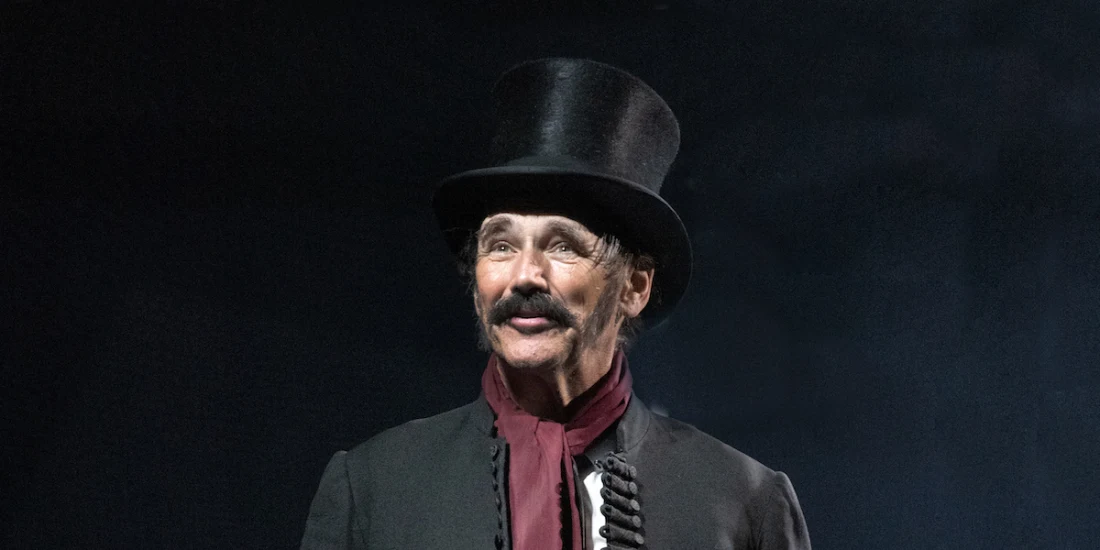'Dr Semmelweis' review – Mark Rylance is riveting as a maverick, pioneering doctor
Read our four-star review of Dr Semmelweis, starring Mark Rylance, now in performances at the Harold Pinter Theatre to 7 October.
An astonishing pioneer of medicine finally gets his due in this powerful play co-created by Mark Rylance and Stephen Brown, and starring the former. Dr Semmelweis premiered at Bristol Old Vic last year, and, thanks to an inventively expressive production by Tom Morris and Rylance’s riveting performance, is now a compelling addition to the West End.
Ignaz Semmelweis was a Hungarian obstetrician working at the prestigious Vienna General Hospital in the 1840s when he realised that what was called “childbed fever” – the cause of death for thousands of mothers and babies – could be prevented simply by rigorous hand-washing.
Up to that point, doctors would regularly examine wounds or attend autopsies, then go straight to their patients in labour, spreading fatal germs – what we now know as bacteria. However, Semmelweis’s antiseptic theories weren’t believed until decades later, thanks to the likes of Louis Pasteur and Joseph Lister.
It’s a fascinating piece of history, though could easily make for dry drama. Thankfully, Rylance – who holds the stage like no one else; he’s the magical element among the science here – is perfect casting for this eccentric outsider, who has the genius to see what no one else can, but not the skills to convey it without insulting his boss and the entire medical establishment.
His hot-blooded, fanatical Semmelweis isn’t just a martyr; he lets anger, frustration, pride and pent-up grief (he’s traumatised by the first mother who dies in his care, a dancer, and by personal loss) get the better of him. Nor does he understand that this is a collegiate environment: you have to respect those who came before, and work with others to ensure lasting change. That includes having patience with those who express doubts or make mistakes.
There’s plenty of topical resonance, whether it’s the overlap between medicine and politics, the unwillingness of big institutions to change, the importance of clear communication, or the focus on hygiene that became so vital during Covid. Never mind Chris Whitty – this play makes you want to scrub your hands for at least two renditions of “Happy Birthday”.
The other key element is Morris’s use of music and movement (by Adrian Sutton and Antonia Franceschi respectively). The ever-present string quartet gets under your skin, provoking a potent emotional response, while dancers haunt the action like ghosts or avenging Furies. This female chorus is a constant reminder of the women who died, ensuring they don’t just become numbers, and also illustrates how Semmelweis’s mind unravels as he becomes too immersed in the past.
It’s an effective addition, although occasionally the stage is overcrowded. We could probably do without the framing device involving Semmelweis’s wife, which spells out the themes too bluntly. More enjoyable are the play’s winking references to performance and audiences: at one point, Semmelweis clambers out of the theatre’s box to invade a ballet, doing a literal dance with Death.
Ti Green’s atmospheric design features a huge oculus above, casting dramatic shafts of light (beautiful lighting by Richard Howell), plus a revolve which allows for sharp juxtapositions – like Semmelweis aiding with a birth on one side and conducting an autopsy on the other.
There are strong supporting performances from Alan Williams as Semmelweis’s implacable superior, Ewan Black as his maths-whiz intern, Chrissy Brooke as that first doomed patient, Jude Owusu as a loyal colleague, Daniel York Loh as a rock-star lecturer, and, in particular, Pauline McLynn as the shrewd Nurse Muller, whose invaluable experience is largely overlooked because of her gender.
Most importantly, this stirring tragedy gives a voice to the voiceless: not just the unfairly treated Semmelweis, but the women whose pain was ignored, and whose deaths were dismissed as routine. It’s an ongoing battle, particularly with the fresh attacks on women’s healthcare in America, and this passionate play is a much-needed reminder that we must all think for ourselves and stand up for what we believe in.
Dr Semmelweis is at the Harold Pinter Theatre through 7 October. Book Dr Semmelweis tickets on London Theatre.

Photo credit: Mark Rylance in Dr Semmelweis (Photo by Simon Annand)
Originally published on
